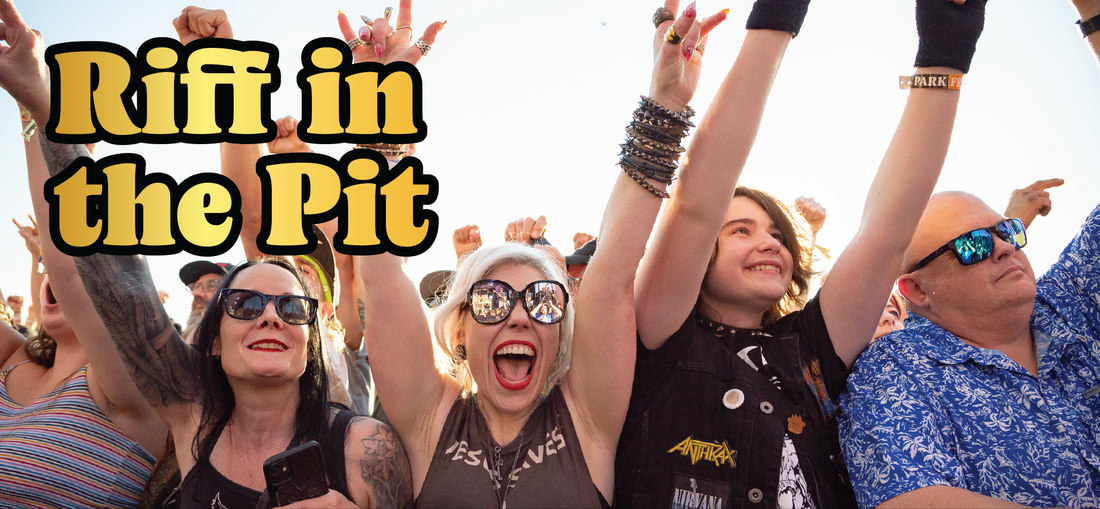
Riff in the Pit: Reflecting on 15 Years of Punk at Rifflandia
Share
Bodies collide, heads bang, and the unmistakable growl of distorted guitars bellow out of amplifiers. “Strugglin' in the streets just trying to survive / Searchin' for the truth is just keepin' us alive!” roars the shirtless musclebound frontman. The burly singer grits his teeth between vocal lines, veins popping out of his neck while his bass rests on the grinning demon tattooed into his hulking torso. The man is none other than Harley Flanagan, the founding bassist and vocalist of New York hardcore punk legends Cro-Mags.

- Photo: Harley Flanagan - Cro-mags, Rifflandia 2024, Liz Rubin
With punks and metalheads ripping the pit and a litany of iconic mosh-worthy tunes blasting out of the speakers, it’s largely indiscernible from any other modern Cro-Mags show. However, this performance is at Rifflandia, a festival headlined by R&B stars TLC, bass-dropping EDM favourite REZZ, and Canadian indie songstress Feist. These artists are legitimate stars of their respective genres with loads of crossover success. By comparison, Harley Flanagan is an underground weirdo that hung out with Joe Strummer and Debbie Harry as a child, has a black belt in jiu jitsu, and was once arrested for getting in a knife fight with his former bandmates. “This is going to be fun and very interesting lol,” Flanagan posted on Instagram the day of the Rifflandia show. Suffice to say, he and his band were a little bit out of place.
Or were they?
Over the course of Rifflandia’s 15 editions, punk has almost always represented a small but meaty part of the lineup. The festival’s original multi-venue format allowed numerous genres to coexist across a variety of small and large spaces across town. It didn’t take long for punk to be offered a seat at the table.
While the first few years of Rifflandia skewed towards indie and electronic, 2010 featured a pair of performances from BC hardcore stalwarts DOA and Dayglo Abortions. Punk had truly arrived in 2012 with one the most chaotic Victoria shows of the 2010s. Anchored by Toronto’s Fucked Up and Vancouver’s White Lung, a five-band post-festival afterparty brought chaos and destruction to Soprano’s. Originally slated to be held at Sugar (now Capital Ballroom), renovations to the venue were incomplete, forcing the show to be moved to the now-defunct karaoke bar. People got moshed into tables, mic stands dislodged ceiling tiles, and a tidal wave of rowdy punks flooded the musky, sweaty dive.

- Photo: Jesse F. Keeler - Death From Above 1979, Rifflandia 2013, Alix Critchley
The following year saw the festival have its first punk-adjacent headliner, Death From Above 1979, and a handful of regional favourites in the undercard. The Toronto duo brought the mosh to the Main Stage with a raucous set of dancefloor-igniting ragers. Victoria pop-punk legends, Bum, reunited to play the next year, while Single Mothers brought a level of anarchic mayhem to the Copper Owl that matched the Soprano’s show from two years previous. The Ontario post-hardcore miscreants riled the crowd into a ferocious frenzy, and it didn’t take long for the floor to become slick with a slurry of booze, blood, and broken glass. With the venue being stageless, it was impossible to tell where the crowd ended and the band began. A tower of speakers even got knocked into the crowd before being communally erected just as quickly. If rumours are to be believed, the venue banned punk after that. Honestly? Fair enough.
The next few years were a bit lighter on the genre aside from some smaller performers in the fine print and a set from Punk Rock Karaoke, an act that invites members of the crowd to sing classic songs alongside members of Circle Jerks, The Adolescents, and The Dickies. The last year of Rifflandia’s original run, 2018, featured another two performances from Fucked Up and an explosive set from Toronto noise-rockers METZ that truly tested the limits of the CRD’s volume bylaws.

- Photo: Damian Abraham - Fucked Up, Rifflandia 2018, Hannah Covey
After a gap year and a global pandemic, Rifflandia was back in 2022. However, with the multi-venue format left behind in favour of a streamlined approach, would there still be room for punk on the lineup? As it turned out - absolutely yes - but this time with a greater focus on legacy artists that Victoria rarely gets.
The last few years have seen the likes of riot grrrl pioneers Bikini Kill, crossover-thrash icons Suicidal Tendencies, grunge-rockers L7, the aforementioned Cro-Mags, and one of the genre’s founding fathers, Iggy Pop, grace the Rifflandia stage. This year features California pop-punk pioneers Descendents, another landmark riot grrrl group in Sleater-Kinney, and headliner Public Enemy, one of the more punk-spirited acts in hip-hop history among its marquee acts.

- Photo: Donita Sparks - L7, Rifflandia 2024, Laura Harvey
With 15 years of punk baked into its DNA, the question remains: is a rowdy, aggressive, and confrontational band out of place at a festival like Rifflandia?
The skeptical punk purist would likely say yes. Punk is an inherently countercultural movement. Its origins are in basements, youth halls, squats, and revolting dive bars with bathrooms so vile that no sane person would dare enter them. Even today, there is nothing quite like a cheap, inclusive punk show in a quirky space.
Even as punk got bigger in the 90s and certain bands became legit rock stars, the genre largely stayed monocultural. Arena-level bands like Blink-182 and Green Day would still have other punk or punk-adjacent bands open for them and play rock-focused festivals. If you were into punk, it might have been considered a faux pas in some circles to also be into pop, hip-hop, or electronic.
Rifflandia is an independent local event that’s inspired by a love of music and the city it calls home, but it’s a far cry from a $15 hardcore show in a community centre. It takes place in a sprawling venue with numerous stages. It has major sponsors and advertisers. The full pass costs hundreds of dollars. An event of its size has to adhere to a certain level of mainstream appeal to succeed. Simply put, a lineup full of punk and hardcore bands, even popular ones, isn’t going to move enough wristbands to ensure its survival.
With that in mind, if you’re a diehard punk fan and you wouldn’t be caught dead at a festival like Rifflandia, I get it. However, as a lifelong fan of the genre, I would say that these acts do belong. In fact, it’s their inclusion that makes Rifflandia and other events like it so much stronger.
Punk is often its most compelling when it invades a mainstream space, whether that be FEAR playing Saturday Night Live, The Offspring and Nirvana exploding onto MTV, or Rage Against The Machine broadcasting radical leftist politics on FM radio. As the saying goes, a rising tide lifts all boats. When punk bands get an opportunity to break out of their niche, it brings more people into the subculture and ensures its continued relevance. I understand the urge to gatekeep; a culture like punk is founded on a certain set of tenets and ethics and it loses this if it lets the wrong people in. However, it’s a gate, not a wall. Some kid is going to see Descendents or Sleater-Kinney at Riff, it will be their first exposure to the genre, and will ignite a spark inside them. A longtime music fan who was never into punk may even see them and go “Hey, maybe I like this, too.”

- Photo: Kathleen Hannah - Bikini Kill, Rifflandia 2022, Lindsey Blane
The monocultural days of music scenes are also long behind us. With radio, television, and press no longer categorizing music for the masses, and streaming and social media taking over, newer music fans kind of just listen to everything. If you’re a fan of Descendents or Sleater-Kinney and are hesitant to buy a pass because you don’t think you’re into the rest of the lineup, give it a chance. You may find a new style or sound that you enjoy.
I’ve been to punk-focused festivals, and by the end of them I’ve always been desperate to hear something else. I’ve also been to festivals with no aggressive bands, and by the end of the day, I was always dying to see one. My favourite festivals have always been the ones that mix both and provide an eclectic offering of styles. I also have good authority that a lot of Rifflandia’s organizers have roots in DIY punk scenes. It’s the skills they developed in those communities that equipped them to throw an event of the festival’s scale and scope.

- Photo: Suicidal Tendencies, Rifflandia 2023, Liz Rubin
I think back to that METZ performance in 2018. There was a moment where the frontman looked out towards the packed tent between songs and remarked something along the lines of “We don’t normally get to play things like this so thanks for checking us out.” So check the punk bands out and show them some love, even if it’s not where they usually play. Hell, to this day, the biggest mosh pit I’ve seen in my life was The Descendents at Coachella, an event several times larger and more mainstream than Rifflandia. Maybe we can top it?
– Michael Luis. Michael Luis is a writer, humourist, and musician from Victoria. He currently plays in the bands Blackwood Kings and Calutron Girls. His writing has been published in the likes of The Hard Times, Absolute Underground, and Bandcamp Daily. He has attended every Rifflandia since 2011 and owns too many black t-shirts.
